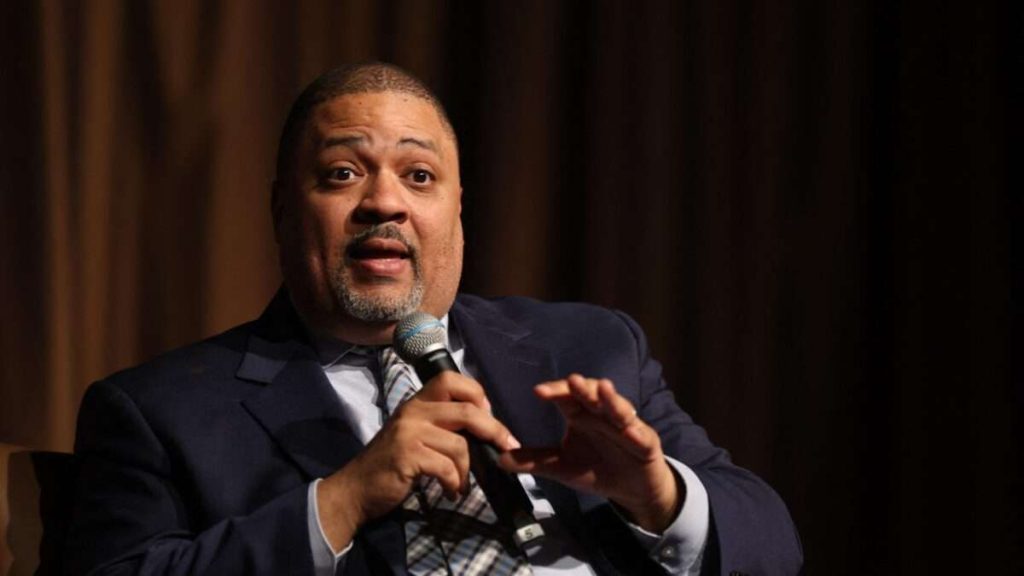A year after Manhattan District Attorney Alvin Bragg announced 34 felony charges against Donald Trump, the former president’s trial is about to begin. Yet people are still arguing about how to describe the case. This debate is not merely rhetorical. It reflects the disconnect between the counts that Trump faces, all of which allege falsification of business records, and the essence of his crime as Bragg sees it, which is hiding negative information from voters.
“Although it has long been referred to as the ‘hush money’ case,” says CNN legal analyst Norman Eisen, “that is wrong. We should call it an ‘election interference’ trial going forward.”
The reason people call it a “hush money case,” of course, is that it would not exist but for the $130,000 that Trump lawyer Michael Cohen paid porn star Stormy Daniels shortly before the 2016 presidential election to keep her from talking about her alleged affair with Trump. But Eisen, who served as co-counsel to the House Judiciary Committee during Trump’s first impeachment, joins Bragg in arguing that the significance of the case transcends those tawdry details.
“We allege falsification of business records to the end of keeping information away from the electorate,” Bragg said in a January interview with NY1. “It’s an election interference case.” That sounds important, and it calls to mind the federal charges based on Trump’s audacious attempts to remain in office after he lost the 2020 presidential election. But this characterization, which Bragg started emphasizing after Special Counsel Jack Smith unveiled the federal indictment last August, is hard to take seriously.
“As this office has done time and time again, we today uphold our solemn responsibility to ensure that everyone stands equal before the law,” Bragg said when he announced the New York indictment in April 2023. “No amount of money and no amount of power changes that enduring principle.” Underlining that point, Bragg added: “These are felony crimes in New York. No matter who you are. We cannot normalize serious criminal conduct.”
Bragg was on firm ground in arguing that felonies are felonies. But why was this “serious criminal conduct”? Bragg’s explanation was underwhelming: “True and accurate business records are important everywhere, to be sure. They are all the more important in Manhattan, the financial center of the world.”
In addition to that eye-glazing gloss, Bragg presented the seed of his “election interference” argument. “We allege Donald Trump and his associates repeatedly and fraudulently falsified New York business records to conceal damaging information and unlawful activity from American voters,” he said.
Mary McCord, executive director of the Institute for Constitutional Advocacy and Protection at Georgetown University Law Center, echoes that take in a recent New York Times discussion of the case. “The falsification of business records seems rock-solid based on the documentary evidence,” she says. “The question for the jurors will be Trump’s knowledge and intent.” McCord thinks “it’s a very winnable case for the D.A.” because prosecutors “will give the jurors plenty of evidence” that Trump’s motive in falsifying business records was “to prevent information damaging to candidate Trump from becoming public just weeks before the 2016 election.”
If you read the indictment and the accompanying statement of facts, you will notice a glaring chronological problem with that account: The criminal conduct that Bragg alleges all happened after the 2016 election. Since Trump was already president, ensuring that outcome could not have been his motive.
Beginning in February 2017, the indictment says, Trump reimbursed Cohen for the hush money with a series of checks, which he disguised as payment for legal services. The indictment counts each of those checks, along with each of the corresponding invoices and ledger entries, as a distinct violation of a state law that makes falsification of business records “with intent to defraud” a misdemeanor.
Since all of this happened after Trump was elected, it is clearly not true that the allegedly phony records “conceal[ed] damaging information…from American voters” in 2016 or that the “falsification of business records” was aimed at “keeping information away from the electorate,” thereby helping Trump defeat Hillary Clinton. Eisen concedes this temporal difficulty:
Election interference skeptics contend the charges here are for document falsification by the Trump organization in 2017, after the 2016 election concluded, to hide what happened the year before from being revealed. How can we call this an election interference trial, they ask, if the election was already over when the 34 alleged document falsification crimes occurred?
Those skeptics, Eisen says, overlook the fact that “the payment to Daniels was itself allegedly illegal under federal and state law” and “was plainly intended to influence the 2016 election.” Although Cohen “was limited by law to $2,700 in contributions to the campaign,” Eisen writes, “he transferred $130,000 to benefit the campaign, allegedly at Trump’s direction. That is why Cohen pleaded guilty to federal campaign finance violations (in addition to other offenses), for which he was incarcerated. And no one can seriously dispute that the reason he and Trump allegedly hatched the scheme was to deprive voters of information that could have changed the outcome of an extremely close election.”
Eisen glosses over the difficulty of distinguishing between personal and campaign expenditures in this context, which is crucial in proving a violation of federal campaign finance regulations. That difficulty helps explain why the Justice Department never prosecuted Trump for allegedly directing Cohen to make an excessive campaign contribution. Contrary to what Eisen says, there is a serious dispute about whether Trump “knowingly and willfully” violated federal election law.
In any case, it is too late to prosecute that alleged crime. And even if it weren’t, Bragg would have no authority to enforce federal law.
Falsification of business records can be treated as a felony only if the defendant’s “intent to defraud includes an intent to commit another crime or to aid or conceal the commission thereof.” Bragg has mentioned a violation of the Federal Election Campaign Act as one possible candidate for “another crime.” But it is plausible that Trump did not think paying off Daniels was illegal. If so, it is hard to see how his falsification of business records could have been aimed at concealing “another crime,” even assuming that phrase includes violations of federal law, which also is not clear.
The legality of the hush payment is uncertain because it turns on whether Trump was trying to promote his election or trying to avoid personal embarrassment and spare his wife’s feelings. The same ambiguity poses a challenge for Bragg in trying to convict Trump of felonies rather than misdemeanors: Did he falsify business records to cover up another crime or simply to keep his wife in the dark?
As Bragg sees it, Trump “corrupt[ed] a presidential election” by hiding information that voters might have deemed relevant in choosing between him and Clinton. But there is nothing inherently illegal about that: If Trump had persuaded Daniels to keep her mouth shut simply by asking nicely, the result would have been the same. Bragg’s “election interference” narrative, insofar as it makes legal sense at all, requires showing that Trump not only tried to prevent a scandal but committed one or more crimes toward that end.
“People want the hush money case to be the big case that can take down Trump because it may be the only one that goes to trial before the election,” UCLA election law expert Richard Hasen, one of the “skeptics” to whom Eisen alludes, writes in the Los Angeles Times. But “the charges are so minor I don’t expect they will shake up the presidential race.”
Hasen rejects Bragg’s “election interference” framing. “Failing to report a campaign payment is a small potatoes campaign-finance crime,” he says. “Willfully not reporting expenses to cover up an affair isn’t ‘interfering’ with an election along the lines of trying to get a secretary of state to falsify vote totals, or trying to get a state legislature to falsely declare there was fraud in the state and submit alternative slates of electors. We can draw a fairly bright line between attempting to change vote totals to flip a presidential election and failing to disclose embarrassing information on a government form.”
Although “I certainly understand the impulse of Trump opponents to label this case as one of election interference,” Hasen adds, “any voters who look beneath the surface are sure to be underwhelmed. Calling it election interference actually cheapens the term and undermines the deadly serious charges in the real election interference cases.”
The post Alvin Bragg’s ‘Election Interference’ Narrative Is Nonsensical appeared first on Reason.com.







